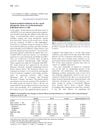 4 citations,
November 2011 in “Archives of Dermatology”
4 citations,
November 2011 in “Archives of Dermatology” Hamilton scale imprecise, hair shaft diameter decreases, stem cell transplant regrows hair, ECP ineffective for alopecia areata universalis.
 49 citations,
April 2000 in “Journal of The American Academy of Dermatology”
49 citations,
April 2000 in “Journal of The American Academy of Dermatology” Despite progress in treatment, the exact cause of Alopecia areata is still unknown.
 10 citations,
January 2018 in “Postępy Dermatologii i Alergologii”
10 citations,
January 2018 in “Postępy Dermatologii i Alergologii” Treating alopecia areata every 3 weeks with diphenylcyclopropenone is more effective than weekly treatments.
 33 citations,
November 2006 in “Survey of Ophthalmology”
33 citations,
November 2006 in “Survey of Ophthalmology” Madarosis is the loss of eyelashes and eyebrows due to various health issues and requires thorough examination to diagnose and treat the underlying cause.
 13 citations,
July 2011 in “Photomedicine and laser surgery”
13 citations,
July 2011 in “Photomedicine and laser surgery” Coloring white hair before IPL treatment effectively helps remove it.
9 citations,
August 2021 in “Journal of clinical medicine” Pili torti is a rare condition where hair is twisted and breaks easily, often linked to genetic disorders or other health issues.
 14 citations,
July 2012 in “Journal of the American Academy of Dermatology”
14 citations,
July 2012 in “Journal of the American Academy of Dermatology” Topical tacalcitol ointment can help improve symptoms of EFFC.
 1 citations,
October 2022 in “Cureus”
1 citations,
October 2022 in “Cureus” Patients with chronic skin disorders often experience depression, anxiety, and reduced quality of life and may benefit from psychiatric help.
 9 citations,
August 2018 in “Journal der Deutschen Dermatologischen Gesellschaft”
9 citations,
August 2018 in “Journal der Deutschen Dermatologischen Gesellschaft” Most patients with frontal fibrosing alopecia are middle-aged women, often have thyroid disease, and some treatments can help stabilize the condition.
 October 2023 in “European medical journal. Dermatology”
October 2023 in “European medical journal. Dermatology” Hair loss greatly affects quality of life, and dermatologists are crucial for proper diagnosis and treatment.
 11 citations,
August 2012 in “Canadian journal of ophthalmology”
11 citations,
August 2012 in “Canadian journal of ophthalmology” Eyelash alopecia areata often goes undiagnosed and can lead to complete eyelash regrowth, especially in younger patients.
 August 2009 in “Expert Review of Dermatology”
August 2009 in “Expert Review of Dermatology” Pregnancy can cause skin changes and conditions that need correct diagnosis and treatment for the health of the mother and baby.
 61 citations,
January 2019 in “American Journal of Clinical Dermatology”
61 citations,
January 2019 in “American Journal of Clinical Dermatology” The cause of Frontal Fibrosing Alopecia is unclear, diagnosis involves clinical evaluation and various treatments exist, but their effectiveness is uncertain.
 42 citations,
January 1998 in “BioDrugs”
42 citations,
January 1998 in “BioDrugs” Azathioprine's effectiveness and safety require careful monitoring and more research, especially regarding its use with corticosteroids and the role of TPMT status in patients.
 August 2015 in “Dermatología Argentina”
August 2015 in “Dermatología Argentina” Frontal fibrosing alopecia causes hairline recession and eyebrow loss in postmenopausal women.
 3 citations,
July 2022 in “Indian journal of dermatology, venereology, and leprology”
3 citations,
July 2022 in “Indian journal of dermatology, venereology, and leprology” Patients with alopecia areata have higher oxidative stress and lower antioxidant levels.
 41 citations,
September 2018 in “Australasian journal of dermatology”
41 citations,
September 2018 in “Australasian journal of dermatology” No systemic treatment for alopecia areata has strong evidence of effectiveness.
 July 2022 in “International journal of dermatology, venereology and leprosy sciences”
July 2022 in “International journal of dermatology, venereology and leprosy sciences” More frequent and severe skin problems are linked to higher daily alcohol consumption.
 January 2024 in “International Journal of Veterinary Sciences and Animal Husbandry”
January 2024 in “International Journal of Veterinary Sciences and Animal Husbandry” The Pomeranian dog fully recovered from mange after 35 days of treatment.
 5 citations,
October 1984 in “The BMJ”
5 citations,
October 1984 in “The BMJ” Up to 50% of scalp hair can be lost before it appears thin, and treatment is only needed for hair loss caused by diseases or deficiencies.
 7 citations,
December 2013 in “The Journal of Dermatology”
7 citations,
December 2013 in “The Journal of Dermatology” A woman's hair turned gray and fell out after starting a cancer drug called imatinib mesylate.
6 citations,
January 2013 in “Journal of Veterinary Medical Science” The dog's skin and anemia issues returned after stopping treatment for Babesia gibsoni.
 2 citations,
January 1997 in “Leprosy Review”
2 citations,
January 1997 in “Leprosy Review” A neglected leprosy treatment led to rare scalp hair loss in an Indian woman, which improved with proper medication.
 143 citations,
September 1991 in “Archives of Dermatology”
143 citations,
September 1991 in “Archives of Dermatology” Generalized pustular psoriasis patients often need strong medication and careful treatment due to flare-ups and complications.
 February 2010 in “Journal of The American Academy of Dermatology”
February 2010 in “Journal of The American Academy of Dermatology” A woman with thymoma developed a rare chronic condition similar to graft versus host disease after surgery.
 1 citations,
August 2005 in “British Journal of Dermatology”
1 citations,
August 2005 in “British Journal of Dermatology” Accidentally eating a topical steroid may rarely cause acute generalized pustular psoriasis.
 September 2023 in “Journal of Parasite Science”
September 2023 in “Journal of Parasite Science” The dog's skin condition improved significantly after seven days of treatment.
 July 2023 in “The Journal of Family Practice”
July 2023 in “The Journal of Family Practice” The man was diagnosed with lupus and improved with treatment.
 January 2008 in “US endocrinology”
January 2008 in “US endocrinology” Mutations in the glucocorticoid receptor gene cause reduced sensitivity to glucocorticoids and may lead to poor response to treatment.
 January 2011 in “Journal of The American Academy of Dermatology”
January 2011 in “Journal of The American Academy of Dermatology” Treating generalized granuloma annulare is difficult, with PUVA being the most effective option, but relapses are common.




























